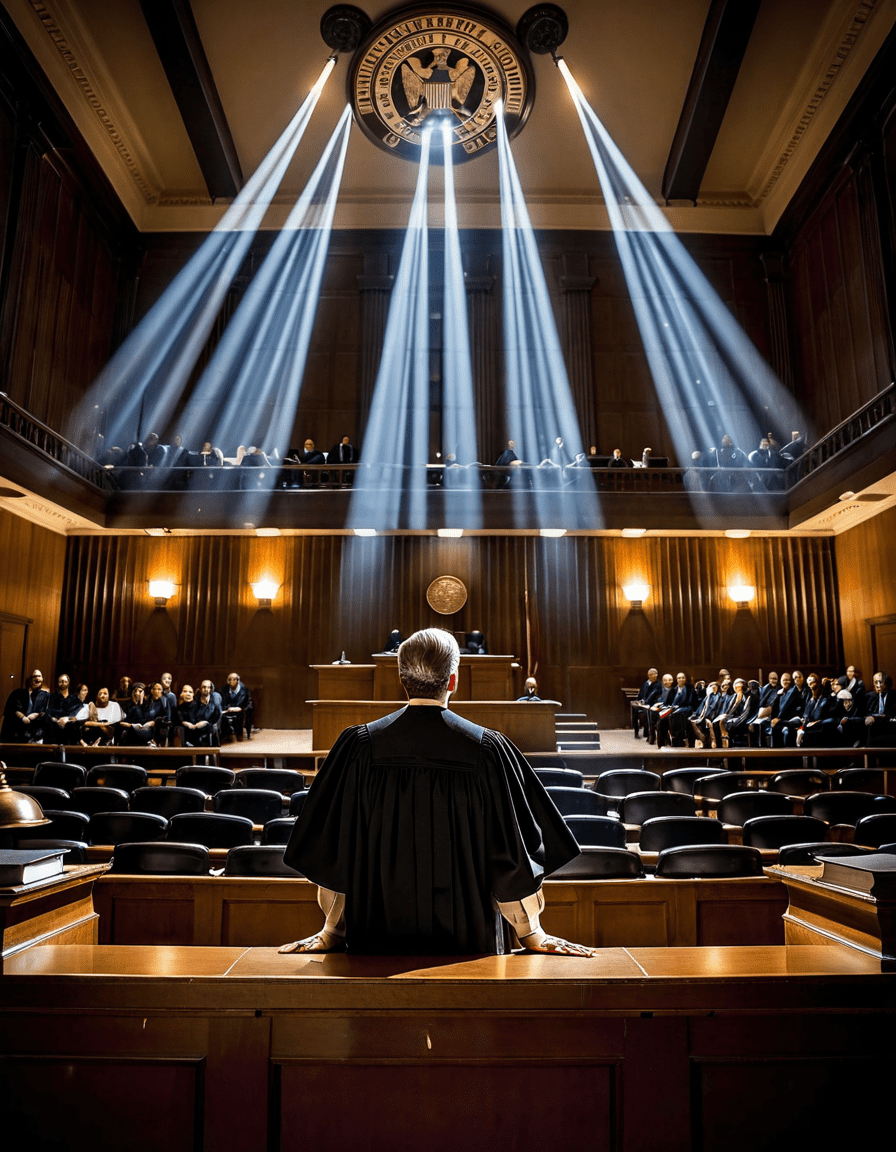In the modern legal landscape, judges play a pivotal role that extends far beyond the courtroom. They are the interpreters of laws, tasked with not just resolving disputes but shaping the legal framework that governs society. With each ruling, judges establish precedents that can influence legislation, protect individual freedoms, and alter societal norms. In examining a landmark case, it’s vital to appreciate how a single decision can resonate throughout the legal system, laying the groundwork for future judicial actions.

The Role of the Judge in Shaping Law
Judges are central to the judicial process, crafting the contours of legal precedent with a pen stroke. Their interpretations set a bar for future cases, showing just how critical the role they assume is. As seen in cases like Brown v. Board of Education, which ruled against racial segregation in public schools, judges have the power to challenge unjust laws. Such rulings not only directly impact affected communities but also signal broader societal shifts, fostering changes that could last for generations.
Judges operate from a foundation of legal knowledge, which they utilize to weigh evidence and arguments presented to them. Their decisions are not taken lightly; outcomes often hinge on the nuanced understanding of existing laws and legal philosophy. For instance, when a judge renders a verdict in a complex case, it can spark discussions about the appropriateness of the law itself, asking whether current statutes serve the community’s needs effectively.
As today’s issues become more convoluted, judges face the challenge of crafting decisions that are both fair and forward-thinking. The law must adapt to the evolving values of society, making the role of the judge ever more vital. From the bench, they must balance authority with empathy, ensuring that each ruling aligns not only with legal standards but also with the principles of justice.

Top 5 Judicial Decisions That Reshaped Legal Norms
The Supreme Court’s landmark ruling deemed racial segregation in public schools unconstitutional, thereby catalyzing civil rights reforms across the nation. Under Chief Justice Earl Warren, the court sent shockwaves through American society, paving the way for future challenges against discriminatory laws.
In a significant win for women’s rights, this Supreme Court decision recognized a woman’s right to make choices about her own body, particularly in reproductive matters. The ruling sparked an on-going national conversation regarding bodily autonomy and privacy rights, maintaining its relevance even decades later.
With this ruling, the Supreme Court confirmed same-sex marriage as a constitutional right. Justice Anthony Kennedy’s majority opinion revolutionized marriage equality and solidified legal protections for LGBTQ+ individuals, underscoring the judiciary’s impact on civil rights.
This decision fundamentally changed the political landscape by allowing corporations and unions to spend unlimited money on political campaigns. Critics argue that this ruling underscores the power of money in politics, raising questions about the integrity of democratic processes.
This pivotal case struck down key provisions of the Voting Rights Act, eliminating federal oversight of state voting changes. The ruling fostered a wave of state-level laws seen as restricting minority voting rights, igniting a national dialogue about electoral access and fairness.
Factors Making Judicial Decisions Impactful
Judge HQ: The Weight of Judicial Leadership
Judges bring a wealth of expertise to their hallowed halls, which informs their rulings and public discourse. Their leadership breeds authority and trust within the legal community. In cases that concern constitutional rights, judges must tread carefully, as their decisions can affect numerous lives, driving the need for responsible judgment.
Unnecessary Precedents and Legal Clarity
Not all judicial rulings create clarity. Decisions that are deemed unnecessary or redundant can often muddle the waters, leading to increased litigation and legal confusion. For example, various lower courts interpret Roe v. Wade in contradictory ways, further complicating the path for individuals seeking reproductive health services.
Canceling Out Inappropriate Legislation
Judges also have the solemn duty of scrutinizing legislation for appropriateness. If a law threatens constitutional rights, wise judges wield the power to strike it down. It’s a delicate balance, but the judiciary’s ability to cancel laws considered excessive helps uphold individual liberties in a democratic society.
The Contingent Nature of Judicial Tenure
The longevity of a judge’s tenure can be two-sided. While it provides stability in the judiciary, it can also lead to outdated perspectives. Life-appointed judges have the potential to deliver rulings grounded in past norms, leaving contemporary issues unaddressed, which may seem inappropriate in light of society’s evolving ideals.
Implications of Judicial Rulings for Future Legislation
The ripples caused by landmark judicial rulings affect society in broad strokes, often reshaping future legislative efforts. Each decision holds the power to propel lawmakers to reassess existing statutes and adapt them to affirmative standards of equity and justice. For instance, decisions regarding voting rights compel lawmakers to confront discriminatory practices in electoral laws.
Moreover, landmark rulings invite citizens to advocate for reforms, shedding light on laws that may no longer serve their communities. This dynamic encourages ongoing dialogue, reaffirming the critical role of both the judiciary and legislative bodies in safeguarding democracy. The intricate relationship between court decisions and legislative actions reflects an ongoing push toward justice.
Innovative Perspectives on Judicial Evolution
As we analyze the impacts of pivotal cases, it becomes evident that judges are not spectators in the legal landscape. They are active participants in crafting societal norms. A judge’s duty involves wielding authority responsibly while striving for justice that resonates with the community’s values.
Judges embody a profound sense of responsibility, as their rulings influence citizens’ daily lives. Looking forward, it’s crucial for us to remain engaged in the legal discourse and recognize the implications of judicial decisions on both policies and personal freedoms. As societal norms transform, so too must interpretations of law, ensuring that justice remains a tangible reality for everyone in our ever-changing society.
In closing, as we navigate through the consequences of judicial rulings, it’s clear that the role of a judge extends beyond a mere title. Let’s remain aware that each case can create a legacy, influencing entire generations and shaping what justice means for years to come.
Understanding the Role of a Judge in Law
The Judge’s Responsibility
A judge plays a crucial role in the legal system, wielding power that can significantly impact lives. It’s fascinating to think that their decisions can echo as profoundly as those made in cinematic masterpieces, like the emotional battles seen in Revenge Of The Sith. Judges are tasked with interpreting the law, ensuring justice prevails, and they often serve as an unbiased referee in the courtroom drama. Also, did you know that some judges even draw inspiration from unconventional sources? For instance, actors like Bruce Dern bring their roles to life with intensity and detail that can remind judges of the stories they oversee.
The Essence of Legal Alphabet Soup
You might think the courtroom is filled with serious business, but there’s plenty of interesting trivia about judges too! For one, judges are often the unsung heroes who help shape societal norms through their rulings. The cool thing is that just like athletes strive to improve their game through stats, judges often analyze case law and precedents—like examining Khris Middleton Stats or Wemby Stats—to ensure they make informed decisions. Notably, judges also engage in discussions surrounding the currency and economic aspects, akin to keeping an eye on the “precio del dólar hoy” or “en cuánto está el dólar en México” for relevant implications in financial cases.
Cultural Touchstones in the Judiciary
Judges often find themselves navigating a sea of cultural references that influence their understanding of cases. For example, the influence of pop culture can’t be overstated; even anime series like “Beelzebub” or exhilarating titles such as Kandagawa Jet girls might foster discussions about contemporary values in courtrooms. This engagement with wider cultural dialogues enhances judges’ perspectives, allowing them to align their legal judgments with evolving societal values. You could say judges draw from a plethora of resources, much like individuals who identify with their heritage, reflecting on what it means to be Philipino or otherwise, as they consider the diverse backgrounds of those they serve.
With all these layers, the role of a judge is both fascinating and vital, and understanding these insights not only enriches our appreciation for the judicial system but adds depth to the decisions that have the power to shape our laws and society.




